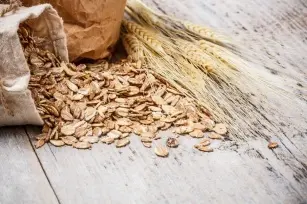
The importance of fiber in a healthy, balanced diet is well known. A large amount of fiber in the daily menu is recommended, but it should be remembered that at the same time too much fiber can have unpleasant effects. Unfortunately, there is no golden mean for everyone. Each organism reacts individually – the most important thing is to carefully observe what is happening in our body and react immediately.
Why dietary fiber?From the point of view of nutrition, dietary fiber is important, which can be divided into water-soluble and insoluble fiber. Soluble fiber: regulates the work of the intestines, captures toxic compounds enabling their excretion from the body, affects the composition of the intestinal microflora, slows down the absorption of nutrients, reduces the content of cholesterol in the blood and lowers glucose levels. Insoluble fiber: regulates bowel function, stimulates intestinal blood supply and accelerates peristalsis, reduces the energy value of the diet and gives a sense of satiety, stimulates the secretion of digestive juices. Thanks to the above properties, fiber is helpful in preventing and reducing the occurrence of symptoms caused by: obesity constipation, non-insulin-dependent diabetes, cardiovascular diseases, kidney stones, colon cancer, hemorrhoids, appendicitis.
For whom is fiber not recommended?In some diseases, it is even forbidden to eat fiber:
- selected infectious diseases
- gastric and duodenal ulcers
- inflammation of the stomach, intestines, pancreas and bile ducts
- physiological disorders caused by mineral deficiency
Disadvantages of dietary fiber:Consumed in excessive amounts may result in:
- limited absorption of minerals (calcium, zinc, copper, iron, magnesium) and some vitamins – in order to avoid the problem, the consumption of these minerals and vitamins should be increased, but under the supervision of a specialist
- flatulence, abdominal pain, diarrhea – if we introduce it to the diet suddenly – in the short term we will consume large amounts to which our body is not accustomed. Fiber should be introduced gradually, especially in people whose current diet is low in fiber
Where to find it?
- wholemeal, wholegrain bread
- bran and wheat and oat flakes
- buckwheat, barley
- Brown rice
- wholemeal pasta
- vegetables – especially legumes
- fruits – mostly dried
- nuts, almonds, seeds, flax seeds, pumpkin seeds, sunflower seeds 10 products with the highest fiber content: wheat bran, white beans, soybeans, peas, dried figs, almonds, rye flakes, dried apricots, wheat flakes, prunes.
Remember that!!!In order for fiber to work, water is necessary, thanks to which it swells and can perform its beneficial functions in the body. If we enrich our diet with fiber and forget to provide fluids – the effects may be counterproductive, causing constipation. It is recommended to drink about 1,5-2 liters of fluids a day.









